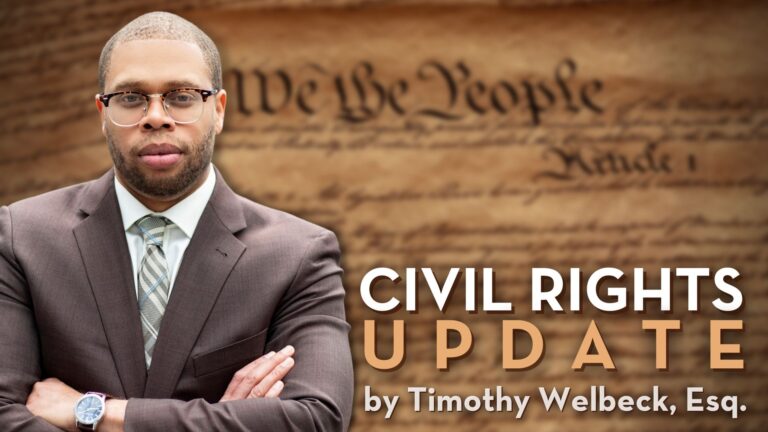 Last week, CAIR-Philadelphia Legal Director Amara Chaudhry-Kravitz served as the course planner for a program devoted to the “right to counsel,” a legal right guaranteed by the 6th Amendment of the United States Constitution and commemorating the 50th anniversary of the Supreme Court’s landmark “right to counsel” case Gideon v. Wainwright.
Last week, CAIR-Philadelphia Legal Director Amara Chaudhry-Kravitz served as the course planner for a program devoted to the “right to counsel,” a legal right guaranteed by the 6th Amendment of the United States Constitution and commemorating the 50th anniversary of the Supreme Court’s landmark “right to counsel” case Gideon v. Wainwright.

Why is the “right to counsel” a legal issue which concerns CAIR-Philadelphia and area Muslims?
CAIR-Philadelphia is a Philadelphia-based legal services provider which, as its chief priority, deals with cases involving governmental actions which unfairly have a disproportionate negative effect upon the American Muslim community. Perhaps not surprisingly, many of the cases handled by our Legal Department deal with government practices which came into being in the aftermath of 9/11 and which have the noble and laudable goal of protecting the United States, and its people, from the threat of international terrorism. Given this context, CAIR-Philadelphia’s primary goal has been to ensure that this intent is not misused in a manner which unfairly discriminates against individual Philadelphia-area Muslims solely on the basis of their actual or perceived Muslim identity. In so doing, our Legal Department has represented individuals who have been accused by some government agencies of being a “threat” to the “security of the United States.”
The most common criticism lodged at CAIR-Philadelphia – both from our critics, and from within the community we serve – is linked to our Legal Department’s willingness to represent persons who have been labeled as a “threat to national security.” Our critics allege that CAIR-Philadelphia, as a legal services provider, is itself a “threat to national security” whenever we provide legal counsel to persons who have labeled as such.
In another society, this criticism would be valid. But this is the United States of America, and that criticism is fundamentally at odds with the American culture upon which our legal history is based.
What does the “right to counsel” reveal about America’s legal history and cultural values?
The Sixth Amendment of the United States Constitution provides that “In all criminal prosecutions, the accused shall enjoy the right… to have the Assistance of Counsel for his defence.” So strong is this cultural mandate of a “right to counsel” that the United States has a system through which the government is legally required – as a principle of constitutional law – to provide an attorney (paid for by the government) to any person accused of a crime who could not otherwise afford one. (See Gideon v. Wainwright). The “right to counsel” is also closely linked to another crucial element of the American legal system: the presumption of innocence and the articulated belief that persons accused of crimes are innocent until proven guilty. (See Coffin v. United States). That is one of the foundations of the American legal culture in which we, as Muslims living in America, all live. In other words, American Muslims live in a country which so strongly believes in the presumption of innocence, and the right to counsel, that our government requires all taxpayers to support a system which provides lawyers to all persons accused of a crime who could not otherwise afford an attorney.
There is a great book on the Gideon case, by the late New York Times columnist Anthony Lewis, called “Gideon’s Trumpet” and a movie based on the book was produced staring Henry Fonda as Gideon.
Since CAIR-Philadelphia has not traditionally represented persons who have been accused in a criminal case, why is this discussion of a “right to counsel” and “presumption of innocence” relevant to us?
Because CAIR-Philadelphia does represent persons who have been labeled, by some governmental agency, as a possible “threat to national security.” Though most of our legal cases do not involve criminal charges, our representation of such persons must be understood within the legal and cultural history of the United States.
In 2011-2012, CAIR-Philadelphia legally represented a Philadelphia-based federal employee who lost his security clearance due to the government’s assertions that his contact to places and persons in the Greater Middle East allegedly made him a “threat to national security.” We took the case to ensure that valid national security policies were not being construed in an unfair discriminatory manner based upon our client’s Muslim identity. Though some were critical of us for providing legal representation to this client, we were ultimately successful when an Administrative Judge within the U.S. Department of Defense determined that our client posed no threat to national security and, as a result, reinstated our client’s security clearance. This was a major legal victory.
See: Litigation against U.S. Department of Defense
In 2013, our Legal Department represented a man whose immigration proceedings had suffered a multi-year delay amid vague and unarticulated “national security” concerns. We, again, took the case to ensure that valid national security policies were not being construed in an unfair discriminatory manner based upon our client’s religious and cultural (Muslim) identity. We were ultimately successful when the same federal agencies which initially expressed “national security” concerns decided that our client did not pose any threat to national security and, as a result of this reversal of opinion, issued our client a green card.
See: Lawsuit Against FBI and USCIS
We took these cases, and other similar cases, because we understand that American legal history and culture so strongly value the presumption of innocence, and the constitutional right to counsel, that we, as Americans, have a duty to honor that history and that culture.
Given the Relevance of the “Right To Counsel” to the American Muslim Community, What Is CAIR-Philadelphia Doing to Educate Others About this “Right To Counsel”?
Since hiring its first attorney in 2011, CAIR-Philadelphia has been involved in continuing legal education (CLE) programs which educate the Philadelphia-area legal community about civil rights issues relevant, not only to Muslims, but also to other currently and/or historically marginalized populations. For example, in November 2012, Amara served as a panelist for a CLE program discussing the problem of “judicial bias” and the extent to which judges’ decisions are affected by racial, ethnic, and other forms of bias and discrimination. In another example, Amara created an April 2013 CLE course which taught lawyers “How to Litigate a School Bullying Case.”
In the most recent example, on November 7, 2013, Amara served as the course planner for a CLE course co-sponsored by the Philadelphia Bar Association and the Pennsylvania Bar Institute which focused exclusively on the constitutional “right to counsel” mandated 50 years ago by the United States Supreme Court’s landmark decision in Gideon v. Wainwright.
Moreover, this CLE demonstrates the extent to which CAIR-Philadelphia’s legal staff is integrated into the larger Philadelphia-area legal community, particularly in the arena of civil rights. In preparing this CLE, Amara utilized her position as Chair of the Philadelphia Bar Association Public Interest Section to organize, and obtain sponsorship for, this CLE program. In addition, Amara relied upon her present and past experiences with other civil rights organizations to recruit panelists for this CLE. She used her position as a board member with the American Civil Liberties Union of Philadelphia (ACLU-Philadelphia) to recruit as panelists Mary Catherine Roper, current Staff Attorney for the ACLU-PA; Albert Flora, current client of the ACLU-PA; and Professor Malia Brink, former Staff Attorney for the ACLU-PA. In addition, Amara utilized her prior career as a criminal defense attorney, which included a three-year stint at the Montgomery County Public Defender’s Office, to recruit panelist Michael Drossner, former Deputy Chief Public Defender for Montgomery County, PA.




